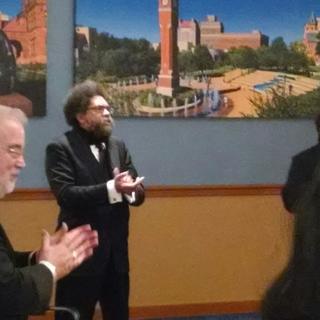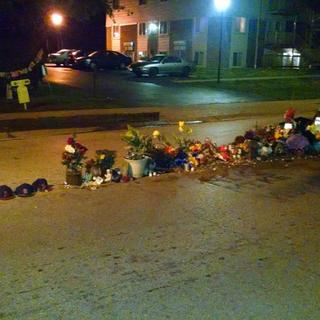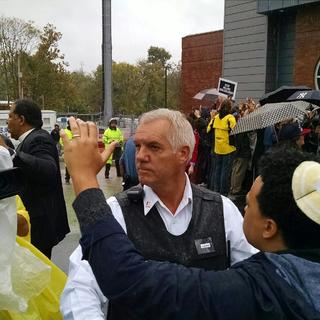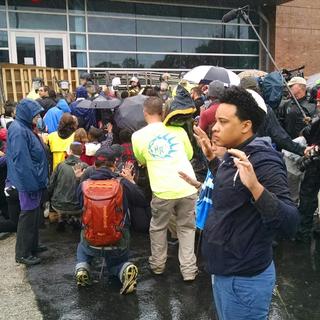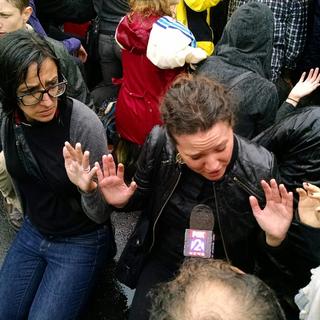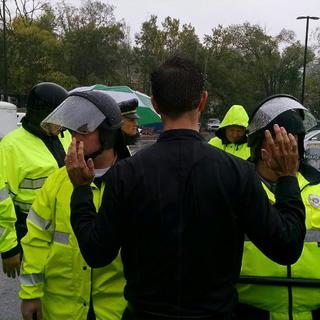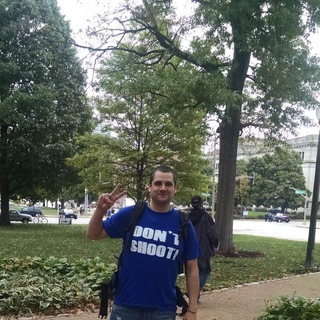One of the main reasons I wanted to travel sixteen plus hours to St. Louis for the highly organized weekend of national resistance called Ferguson October was to make a visible stand against the militarization of our police forces. Of course I could have stayed in Rochester, NY to do that (site of the first race rebellion in q1964) but the national spotlight is on Ferguson so off I went.
When I use the term militarization what I mean is the systematic deployment of chemical weapons like pepper spray and tear gas, the routine use of terror tactics like sound cannons, armored tanks and attack dogs, the default position to repress civil rights in time of conflict and across the board interrogation policies which intentionally and unintentionally lead to the mass incarceration of minorities. This system can benefit a few individuals and corporations but has been an economic drain, moral fiasco, and worldwide embarrassment.
Police brutality is hardly a new phenomenon. The 1968 Democratic Convention in Chicago graphically exposed the militaristic underpinnings of policing whenever the status quo is seriously challenged. In recent years the nation has witnessed nightly raids in urban neighborhoods throughout Los Angeles and Detroit, execution style killings of looters in New Orleans after Hurricane Katrina, “Stop & Frisk” programs in New York City, and the swift take over of an entire city in the grisly wake of the Boston Marathon bombing. For anyone paying attention, the callous murder of 18-year-old Michael Brown on August 9 whose body laid dormant on he cold pavement for more than four hours $was the logical outcome of a vicious trend that has been allowed to escalate and proliferate for decades.
What we are now dealing with is structural violence on a major scale. Over 2 million people- 60% of them black or Latino- are in prison, which is by far the highest number in the world. Inside of American prisons 80% of the inmates are subjected to solitary confinement; which the UN Declaration of Human Rights deems an act of torture. There are five million formerly incarcerated people who are denied the right to engage with the political system through voting. Many of those who are able to stay out of prison once they are released face stigmatization by almost every sector of the job market. As a result of this systemic oppression youth and women of color must live in fatherless homes and face chronic harassment from a society that views them as social pariahs. With so many friends and family members treated as second-class citizens, it is nearly impossible for many people to overcome self-loathing and other addictive coping mechanisms.
This structural violence has also disproportionately targeted immigrants. According to the Department of Justice there have been 2 million deportations in the last 6 years alone. More than 200,000 undocumented workers have been detained in facilities the size of small cities along the U.S. Mexico border.
Is it extreme to call this a slow genocide? When does such a word become applicable? Last year alone over 300 young black men were gunned down in the streets of American cities by police officers.
After spending three days with some demonstrators directly impacted by police brutality in St. Louis, I came to discover that I traveled half way across the country because I do not have the means or relevant training to go to Iraq and Afghanistan. I came to St. Louis to bear witness to crimes against humanity that are no less or no more evil than the killing we hear about overseas. I dare to be even more graphic; I do not see how the beheading of a journalist by militant Jihadists in Iraq is less inhumane than the merciless killing at point blank range of an unarmed college bound student from the Canfield neighborhood.
One of Gandhi's most challenging quotes considers the possibility that these acts of brutality could be equivalent. "What difference does it make to the victimized children of war if the bombs are dropped from planes in the name of democracy or totalitarianism? The results are exactly the same."
I believe that we must ask the same question today. What difference does it make to young black men if the bullets are shot from machine guns fired by fanatic Muslims in Baghdad or enraged police officers in the heartland of America? The results are exactly the same. Because of this, people who stand up for peace and justice must denounce violence no matter what uniform it wears, nation it represents, or creed it follows. As King famously said, "Injustice anywhere is a threat to justice everywhere."
In the case of Michael Brown's execution there are also immediate and local demands that have been made by the residents of Ferguson most affected by the dark legacy of policing in that community. Denouncing structural violence is important. But working to prevent violence from becoming pervasive is even more important.
First and foremost, the people of Ferguson most impacted by police repression demand a swift and impartial investigation by the Department of Justice, the immediate arrest of officer Darren Wilson, and for county prosecutor Robert McCullough to step down and allow a special prosecutor to be appointed. On a national level the people of Ferguson demand Attorney General Eric Holder to use the full resources and power of the Department of Justice to implement a nationwide investigation of systemic police brutality and harassment in black and brown communities.
To ensure transparency, accountability, and safety in these communities they are calling for front facing cameras in police departments with records of racial disparities in stops, arrests, killings, and excessive force complaints. It should be noted that 75% of Ferguson is African-American while 90% of its police department is white. It should also be noted that in Ferguson blacks are stopped 86% of the time and searched 92%, through few are found with contraband. According to the ACLU 90% of the people stopped were innocent. Lastly, the people of Ferguson are calling for the immediate suspension without pay of law enforcement officers that have used or approved excessive use of force. Along with this, their personal information and policing history should be made available to the public.
Although this struggle appears fraught with anger, misunderstanding, and fear on both sides, this is a significant opportunity to reform the way policing is conducted in minority communities all over the country. The more our law enforcement officers are held accountable for excessive use of force, the stronger they will be as public servants, upholders of the Constitution, and defenders of Justice. The police are not an extension of the Federal Government; nor are they a domestic branch of the Armed Forces.
Almost every citizen in America is responsible for paying sales taxes, property taxes, excise taxes, utility taxes, estate taxes, and in the majority of cases income taxes. Some of this money is designated for the important task of recruiting, training, and enlisting police officers that swear an oath to serve and protect taxpayers. They are our first line of protection in times of natural emergency, political instability, and criminal behavior. By and large the police respond in moments of crisis with professionalism, expertise, and courageous compassion. I have family members who belong to the Shield and I would trust them with my life.
What is being called for in Ferguson is to make this culture of professionalism and compassion a fixed reality that promotes mutual awareness and respect between community members and their safety officers. Michael Brown's death has the potential to be a catalyst for systemic change that has the transforming power to save countless lives and enhance the quality of life for citizens standing on both sides of the thin blue line. If the nation is ready to transcend the tragic circumstances of this singular death, we can begin to move towards a future where the next Michael Brown lives a long and extraordinary life. This future can redeem the sins of the past. In the prophetic if slightly amended words of Lila Watson, "If we have come to help each other, then we are wasting our time. But if we have come because our liberation is bound together, then let us work together."
If Ferguson October is the birth pang of a new and radical possibility for redemption than it will not only bring a temporary reckoning to the oppressed but an everlasting infusion of hope for generations unborn.
George Payne
Rochester, NY
Founder of Gandhi Earth Keepers International
www.gandhiearthkeepers,org


